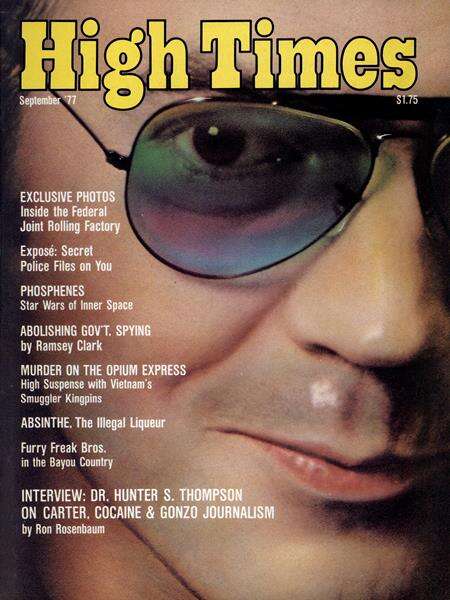High Country: Revisiting the 1977 Hunter S. Thompson High Times cover story
The rag relic was a birthday gift from Fat City Gallery, which says farewell to Aspen on October 1.
High Country
I’m not big into my own birthday. Although I love celebrating with and planning for others, I’ve always preferred a getaway for two over a party. But since we’re still living in a reality of pandemic-related travel uncertainty, I marked my next lap around the sun with a backpack brunch at Crater Lake and intimate dinner at Casa Tua to cap it off.
“After sixteen months of squatting amongst high-end jewelry stores and Italian clothing shops, we’ve decided that Aspen has become too staid and predictable for the sort of radical, freewheeling antics we enjoy most. So we’re closing up October 1st and fleeing the country in search of more revolutionary hideouts,” Fat City Gallery recently declared in an email announcement of its final days in Aspen.
A curated selection of art will remain available online for viewing with a limited number of items available for sale at both tomwbenton.com and fatcitygallery.com.
Thanks to the most perfect gift from my partner, I was treated to a different kind of trip this year — one of time travel. When I opened the New York Times newsprint-wrapped box, I saw Hunter S. Thompson’s signature aviator sunglasses staring back at me on a near mint condition copy of the September 1977 (my birth month and my guy’s birth year) of High Times magazine — procured from Fat City Gallery’s online gift shop for likely far more than its $1.75 newsstand price.
The cover line reads, “Interview: Dr. Hunter S. Thompson on Carter, Cocaine and Gonzo Journalism.” Inside, then-journalist, now-novelist Ron Rosenbaum got “the good doctor to tell all” in a Q&A spanning nine pages with original images captured by famed photographer and Aspenite Lynn Goldsmith (two full page ads for “the no b.s. mushroom growing kit” and hand-painted marijuana cigarette cases included).
After devouring the article (and entire issue) for the first time 44 years post-publish, I came away with not only a feeling of nostalgia, but of the supernatural — many of the prescient statements made by Thompson just hit harder today. While the movement has made prodigious progress — strides Thompson might have even had a hard time believing could happen — since then, it’s a stark reminder of the work that still remains. Rosenbaum described the candid and politically focused interview as groundbreaking, writing in the introduction, “He’s never put his own role into perspective until now.”
In honor of those who risked it all to fight for legalization — High Times and Hunter S. Thompson at the top of that list — here is a handful of meaningful messages within what is now one of my most prized possessions (soon-to-be framed and hung above my writing desk).
High Times: How have your attitudes toward politics changed since you wrote about the ’72 presidential election in “Fear and Loathing on the Campaign Trail?”
Thompson: Well, I think the feeling that I’ve developed since ’72 is that an ideological attachment to the presidency or the president is very dangerous. I think the president should be a businessman; probably he should be hired. It started with Kennedy, where you got sort of a personal attachment to the president, and it was very important that he agree with you and you agree with hi and you knew he was on your side. I no longer give a f— if the president’s on my side, as long as he leaves me alone or doesn’t send me off to any wars or have me busted. The president should take care of business, mind the f—ing store and leave people alone.

High Times: Once I asked a friend of yours why you are so attracted to (Jimmy) Carter, and this guy says, well, Carter’s basically in a lot of ways a conservative good old boy and so is Hunter. Do you think that’s true in some ways, or that you’re a good old boy that’s gone weird?
Thompson: That sounds better. Good old boy gone weird. That’s a good line anyway. I wouldn’t deny that; I would just as soon admit it.
High Times: The inner circle of Carter’s people are serious drug users?
Thompson: Wait a minute, I didn’t say that. For one thing, a term like “serious users” has a very weird and menacing connotation; and, for another, we were talking about a few people from almost everybody’s staff. Across the board…. Not junkies or freaks, but people who were just as comfortable with drugs like weed, booze or coke as we are — and we’re not weird, are we? Hell no, we’re just overworked professionals who need to relax now and then, have a bit of the whoop and the giggle, right?
High Times: Are there some things in your notebooks you can’t put in your stories?
Thompson: All the best stories are unwritten. More and more I find that I can’t tell the whole truth about events. I have one book I’d like to write, and the rest will have to be done to pay the f—ing rent. That’ll be the one where there’ll be no question if anybody’d lying. Well, there will be some question, but the truth is usually a lot weirder than anything you can make up. I’ll make sure that it dooms as many people as possible — an absolutely true account, including my own disaster and disappearances. To hell with the American Dream. Let’s write it off as suicide.

Katie Shapiro can be reached at katie@katieshapiromedia.com and followed on Twitter @bykatieshapiro.




